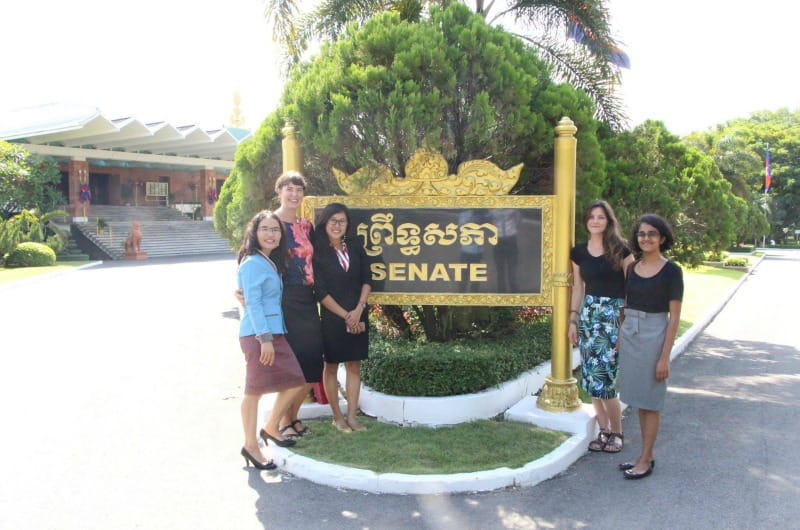
- No link between acetaminophen use during pregnancy and children's autism risk
- Through Connections and Community, Drexel Course Helps Launch Computer Lab in Tanzania
- Drexel’s Pearlstein Gallery Offers Spring Exhibitions Centered on the Healing Properties of Art and Creative Works
- Pinging Pipes Could Help to Identify Lead Water Lines Without Excavation

Drexel graduate student Chandupa Abeyratna, right, at the Cambodian Senate.
This is one of a regular series profiling Drexel students and their co-ops.
In Cambodia, a country still reeling from genocide and civil war in the 1970s, sociocultural issues weigh heavily on the lives of citizens, particularly in rural communities. For six months, Drexel graduate student Chandupa Abeyratna worked at a nonprofit organization focused on addressing those issues and limiting the reach of the country’s more pervasive societal ills. She left with a sharper vision for her future, a deeper understanding of the role of nongovernmental organizations in protecting populations and hope that life is improving for Cambodia’s people.
Abeyratna, who is pursuing a master’s in public health in the Dornsife School of Public Health after receiving a bachelor’s in health services administration as part of an accelerated program at Drexel, spent six months on an international co-op with the People Center for Development and Peace in Phnom Penh, the nation’s capital. The organization works to curtail domestic violence, minimize environmental harm and empower local youth to strive for change. It is also a leader in the push to enact an alcohol policy to combat an addiction that is prevalent even among children because Cambodia lacks an age limit.
In an organization that spreads its attention to a broad group of concerns, Abeyratna’s work was similarly diverse. She helped write fundraising proposals, edited reports, developed presentations to share with partners, reviewed the results of community engagement and worked to promote youth empowerment. It was an all-inclusive education in the operational approach of a nonprofit. Along the way, she learned about the budget process, how staff is trained and how resources are allocated into different projects, as well as how to build connections and partnerships with like-minded organizations abroad.
It all gave Abeyratna a stronger sense of how to develop a community’s trust and break through the uncertainty its members may have about a person or organization’s intentions. Too often, she said, nonprofits act on impulses that are detached from the needs and desires of their communities.
“You have to know where the community is coming from and what they’ve been through,” she said, reflecting on the challenges of making progress in Cambodia. In a country plagued by corruption — like Cambodia — it’s also important to avoid being influenced by outside interests, she said.
In her time in Cambodia — from September 2015 to this March — Abeyratna began to see that some of the most damaging aspects of the country’s culture were being addressed. Drinking rates were going down in most communities, domestic violence incidents reported to the police dropped and the number of people involved in the empowerment efforts rose, she said. At events in some smaller communities, as many as 200 people would turn out to participate and learn how they could make a difference, she said.
Abeyratna, who plans to concentrate her master’s in community health and prevention, found that going into her co-op with an open mind helped her assimilate into Cambodian culture. She had previously been on brief volunteer trips to the Dominican Republic and Sri Lanka during her freshman and sophomore years of college, which gave her a level of comfort that helped her to a rewarding experience. She wants to carry it forward, perhaps toward a role leading a program at a top international organization, or maybe to the Peace Corps.
Community education is a priority for Abeyratna, wherever she ends up. Coming off her time in Cambodia, she’s continuing to build on her own.
About the Drexel Co-op program: More than 98 percent of eligible undergraduate students at Drexel participate in the co-op program, balancing full-time classes and up to three different internships during their time at Drexel. Students can choose from more than 1,700 employers in 33 states and 48 international locations — plus endless possibilities through self-arranged placements.
In This Article
Drexel News is produced by
University Marketing and Communications.
